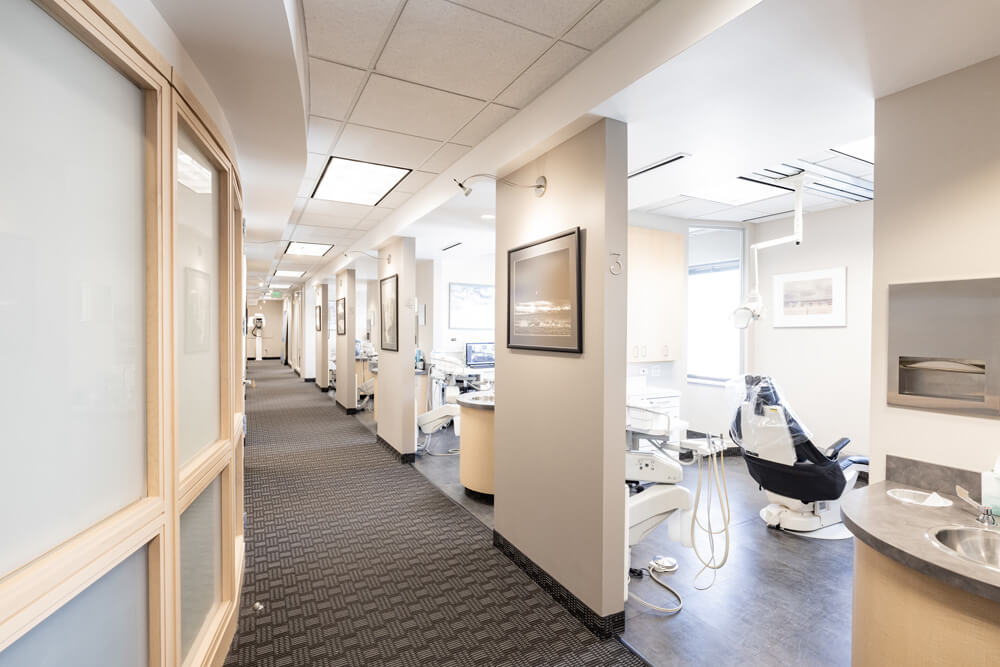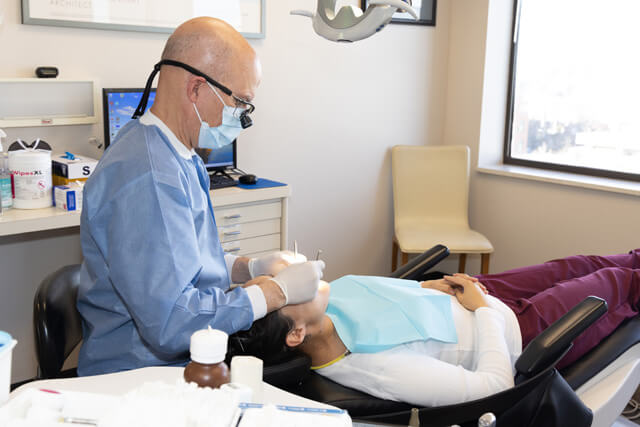Routine Dental Exams and Cleanings
Regular dental exams and cleanings are the cornerstones of good oral hygiene. A dental exam will allow your dentist to catch any minor dental issues or problems early when they are most easily treated. Oral infections can easily spread to other parts of the body, so it is important to regularly visit the dentist to keep your oral health in the best shape possible.
If you are due for a visit to the dentist and are searching for teeth cleaning in Denver or dentist in Denver CO, contact DeWitt Dental Associates, your local Cherry Creek Dentist. Fill out the online booking form or call our Metro Denver office at (303) 321-5656 to schedule your next appointment today.

What Is a Dental Exam?
During a dental exam, your dentist will check your entire mouth, including your teeth, gums, and jaw, for cavities and signs of gum disease (periodontal disease). Left untreated, gum disease can lead to tooth loss and many other oral issues. Your dentist will also look for issues like bruxism and TMJ disorders.
Even if it seems like nothing is wrong with your teeth or if you have no oral issues, it is still important to have a dental exam every six months. Talk to your dentist about any dental care concerns you have.
Some questions you might ask include:
- What is the best way to brush my teeth?
- What are the signs of gum disease?
- Am I at risk for future dental problems?
- What can be done about my tooth sensitivity?
- How can I improve my smile?
- How can I improve the strength of my teeth?
During your dental visit, be sure to tell your dentist about any medical conditions and changes in your oral health, such as bleeding gums or new tooth pain. These could be signs of an underlying issue that needs to be addressed.
Dental X-Rays: Do You Need Them?
Dental x-rays are an important part of a dental exam. They allow your dentist to see what is going on beneath the surface of your teeth and gums. Dental x-rays can detect problems that cannot be seen with the naked eye, such as tooth decay, gum disease, and infections. If you have not had dental x-rays in a while (usually once a year), your dentist may recommend them at your next appointment. Depending on your dental history and current oral health, you may need x-rays more or less often.
Your dentist will place a bib over your chest and clothing to protect you from the x-ray machine. A small amount of radiation is used during dental x-rays and is considered safe.
Some x-rays that may be taken include
- Bitewing: These x-rays show the crowns of your teeth and are used to detect cavities.
- Full Mouth Series: This series of x-rays show all of your teeth, both above and below the gum line. It is usually taken when you first visit the dentist so that a baseline can be established.
- Panoramic: This x-ray shows your teeth, jaws, sinuses, and nasal areas. It is often used to plan dental surgery.
- Occlusal: This x-ray shows your bite and is used to detect problems with your teeth’ alignment.
First Line of Defense Against Oral Cancer
Your dentist is in a great position to catch signs of oral cancer early when it is most easily treated. Oral cancer screenings are quick and painless and could save your life. During an oral exam, your dentist will feel for any lumps or bumps in your mouth and look for any red or white patches. If anything appears out of the ordinary, your dentist may order a biopsy to check for cancerous cells.
What Is a Dental Cleaning?
A dental cleaning is a preventative measure that helps remove plaque and tartar from your teeth before they can cause damage. Plaque is a sticky film of bacteria that forms on your teeth. If plaque is not removed, it will harden into tartar, which can only be removed by a dentist or dental hygienist. Dental hygienists will use special instruments to remove plaque and tartar from your teeth during a dental cleaning. They will also polish your teeth and floss between them.
Types Of Dental Cleanings
Prophylaxis: Prophylaxis is a routine cleaning recommended for most patients. This type of cleaning is usually done once every six months.Scaling and root planing (deep cleaning): Scaling and root planing is a more intensive cleaning recommended for patients with gum disease. This type of cleaning removes plaque and tartar from below the gum line.
What to Expect During a Dental Cleaning

- Before your cleaning begins, your dentist or dental hygienist will ask you about your medical history and any medications you take. They will also examine your mouth to check for any signs of problems.
- Next, your teeth will be scaled. Scaling involves removing plaque and tartar from your teeth using special instruments. Your dental hygienist will use a small, hand-held instrument called a scaler to remove plaque and tartar from the surfaces of your teeth. They will also use a larger, power-driven scaler to remove plaque and tartar from below your gum line.
- After your teeth have been scaled, they will be polished. Polishing helps to remove any remaining plaque and gives your teeth a smooth surface. Your dental hygienist will polish your teeth with a small, rotating brush.
- Finally, your dental hygienist will floss between your teeth. This helps to remove any plaque that was missed during the scaling and polishing process.
Do I Need a Fluoride Treatment?
A fluoride treatment may be recommended for patients who are at high risk for cavities. Fluoride is a mineral that helps prevent tooth decay and can be found in many foods and drinks and some types of toothpaste. Fluoride treatments can help to reverse early signs of tooth decay and can also help to prevent cavities.
A fluoride treatment is a quick procedure that is usually done at the end of a cleaning. First, fluoride in the form of gel or foam will be placed in a tray that fits over your teeth. The tray will be left in place for one to four minutes so that the fluoride can be absorbed by your teeth. Next, the fluoride will be rinsed off of your teeth. Once the fluoride has been removed, you should not eat or drink for 30 minutes to allow the fluoride to be absorbed by your teeth.
Caring for Your Oral Health Between Exams and Cleanings
To maintain good oral health, it is important to brush and floss your teeth every day.
- Proper brushing includes using a soft-bristled toothbrush and gentle circular motions. Be sure to brush the front, back, and top of each tooth surface.
- To floss your teeth, use 20-24 inches of floss. Wrap most of the floss around your middle fingers, leaving about an inch of floss between them. Use your thumbs to guide the floss between your teeth. Gently move the floss up and down, and be sure to floss under the gumline.
It is also important to avoid sugary and acidic foods and drinks. These eat away at tooth enamel and cause cavities and tooth decay. If you do eat sugary or acidic foods, be sure to brush your teeth afterward.
Keep Your Smile Healthy
Keeping your oral health in great shape is our goal, and regular dental exams and cleanings are an important part of achieving that goal. These appointments allow us to catch any problems early and help you maintain a healthy mouth and beautiful smile.
If you’re looking for a dental exam in Denver or teeth cleaning in Denver, schedule your next visit with our experienced Denver dentists. Please call 303-321-5656 today or fill out the online booking form. We are located at 3300 E. 1st Ave. Suite 615 in Denver, Co. We welcome patients from Cherry Creek, Englewood, and all surrounding Metro communities.
FAQ
Do I Need a Professional Teeth Cleaning?
Professional teeth cleaning is necessary to remove plaque and tartar buildup that can lead to cavities, gum disease, and other dental problems. Professional teeth cleaning also helps to prevent bad breath and tooth decay. Regular professional teeth cleaning helps to keep your mouth healthy and your smile looking its best.
How Often Should I Visit The Dentist?
It is recommended that you visit the dentist at least twice a year for a routine dental exam and cleaning. You may need to visit more frequently if you have specific dental concerns. It is important to keep up with regular check-ups and cleanings to maintain good oral health.
Are Dental X-rays Safe?
Yes, dental X-rays are safe and needed for a comprehensive dental exam. X-rays allow your dentist to see the condition of your teeth, gums, and jawbone. They can detect cavities, gum disease, infections, and other issues that may not be visible during a visual examination.
What Are The Risks of Poor Oral Hygiene?
Poor oral hygiene can lead to a variety of dental and medical problems. The most common consequences of poor oral hygiene include tooth decay, gum disease, bad breath, and an increased risk of heart disease. Tooth decay occurs when bacteria in the mouth produce acids that attack the enamel on teeth, which can lead to cavities that require fillings or other treatments to repair.
